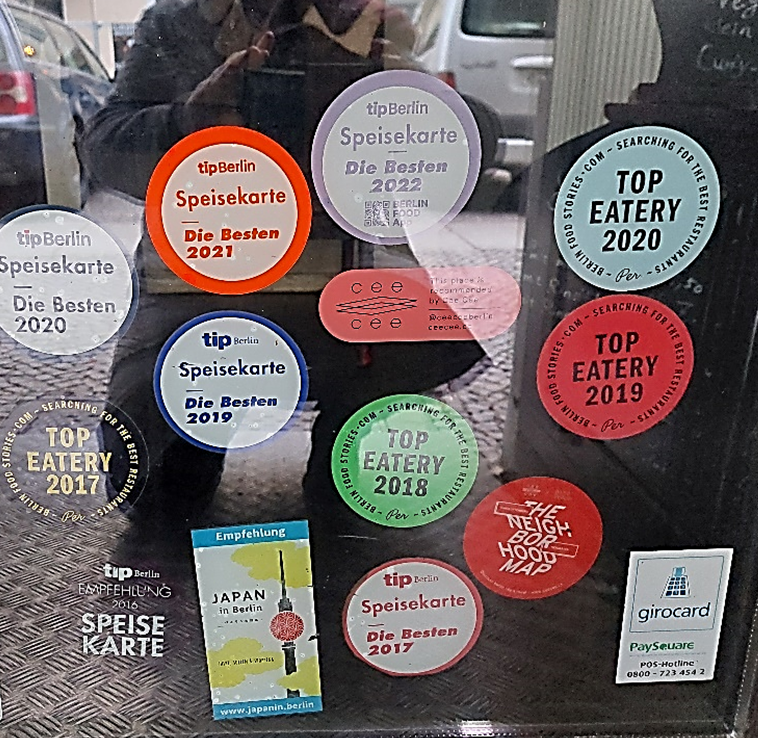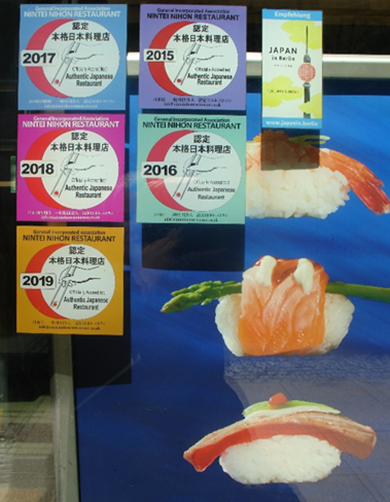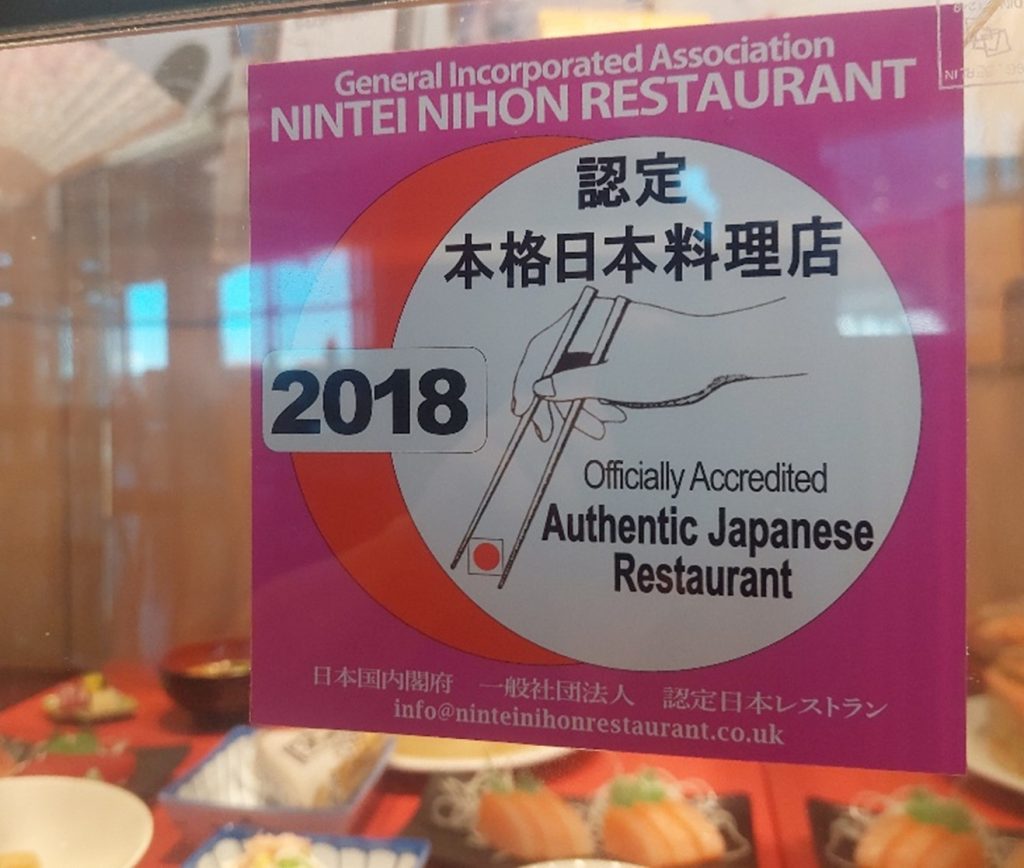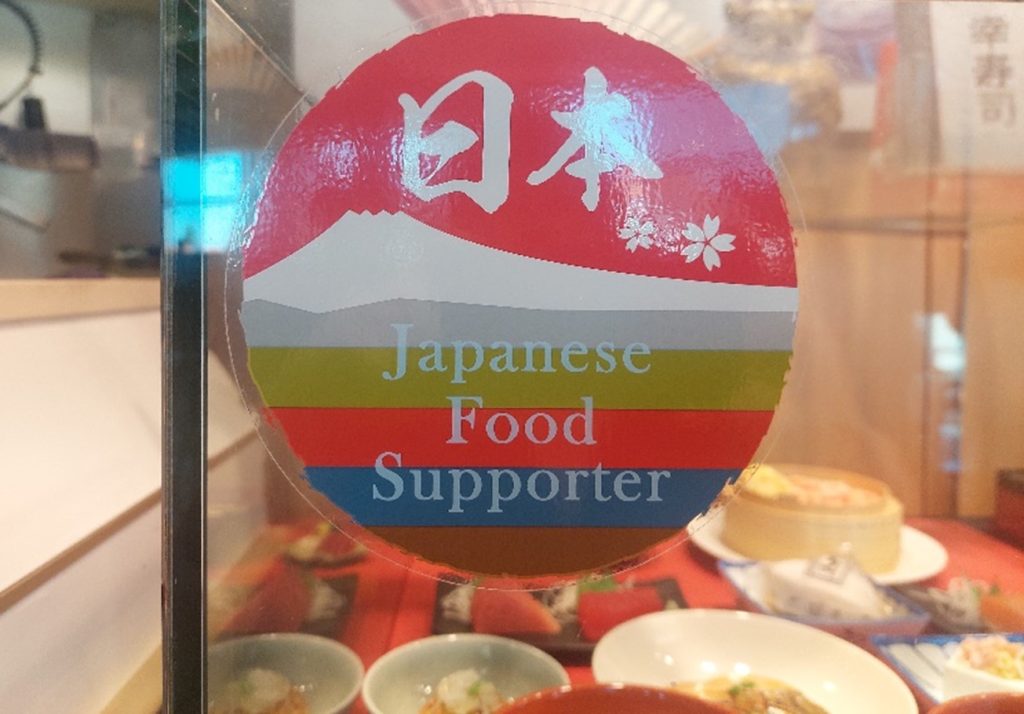by Cornelia Reiher
If you want to go out for Japanese food in Berlin, you have a wide choice of different restaurants offering a variety of dishes in different price categories. It is not easy to make a decision, but there are many institutions and media offering guidance. If you want to dine at a high level, you should take a look at the Michelin Guide, which lists three Japanese restaurants in Berlin in 2023. The internet and social media also provide information and reviews on Japanese restaurants. And if you are out and about in Berlin’s Japanese foodscape, you will notice the many certificates stuck to shop windows, emblazoned on websites or framed on restaurant walls. Media and professional associations award certificates to restaurants to guide customers, but above all to distinguish them from other restaurants, and numerous organizations offer certificates. However, these are not only awarded by organizations in Germany, but Japanese institutions also award certificates to Japanese restaurants in Berlin.


Various certificates and awards in the windows of Japanese restaurants in Berlin
Copyright © Cornelia Reiher 2021 and 2022The Japanese government’s attempt to certify authentic Japanese cuisine abroad so that Japanese business travelers don’t – heaven forbid – accidentally walk into a restaurant run by non-Japanese came under fire in 2006 and was mocked as the sushi police (Sakamoto and Allen 2011). This name was even picked up for an anime series.But other organizations are still certifying Japanese restaurants. One such certificate is the “Authentic Japanese Restaurant” (nintei honkaku nihon ryōri ten) certificate issued by an organization called Nintei Nihon Restaurant Association located in the U.K. and established by a Japanese restaurateur based in London who owns eateries in London, Germany and Tokyo. According to Farrer and Wang (2021: 24), “[m]ost, though not all awardees are Japanese-owned restaurants, including some in Paris, London, and Berlin”. Nintei Nihon Restaurant Association’s stated goal is “to recommend only the establishments serving authentic and mostly affordable Japanese cuisine outside of Japan, where you can confidently take your friends and family too for an enjoyable experience” (Nintei Nihon Restaurant Association 2024).

Copyright © Cornelia Reiher 2023
Since 2016, JETRO, Japan’s exchange and trade organization with offices around the world, including Berlin, has been promoting the Japanese Food Supporter Program, which was established by the Ministry of Agriculture, Forestry and Fisheries (MAFF) to foster Japanese food worldwide. Its mission is “to bring safe and delicious Japanese food and alcoholic beverages to all corners of the world“ (JETRO 2024). Until the end of January 2024, 5,503 stores and restaurants were certified as Japanese food supporters (ibid.). The certificate indicates that restaurants use Japanese ingredients. JETRO Berlin has been trying to promote the certificate for 5 years. As restaurants receive no reward other than a sticker and have to take part in time-consuming surveys about which products are used, it is not easy to convince restaurants to adopt the logo, a JETRO official told me.

Copyright © Cornelia Reiher 2023
Another JETRO initiative to introduce Japanese restaurants to customers is a restaurant guide, which was published in 2023 and is currently being revised as new restaurants open and others listed in the current guide have already closed. Restaurants listed in the guide are selected if at least the chef or owner is Japanese. The criteria underlying the awarding of the certificates presented here and the inclusion in the restaurant guide all relate to a concept of authentic Japanese cuisine, which refers either to the involvement of Japanese people in the preparation of the food or to the origin of the ingredients from Japan. The interests behind the initiation and dissemination of such certificates are diverse and range from supporting Japanese restaurateurs to marketing Japanese agricultural products. While the restaurant guide is most likely to provide consumers with information, it remains to be seen to what extent certificates like the Japanese Food Supporter certificate or the Nintei Nihon Restaurant certificate actually provide consumers in Berlin with guidance in their search for delicious Japanese food and would need to be investigated separately.
Reference
Farrer, James and Chuanfei Wang (2021), “Who owns a cuisine? The grassroots politics of Japanese food in Europe,” Asian Anthropology, 20:1, 12-29, DOI: 10.1080/1683478X.2020.1774960.
JETRO (2024), The certification program of Japanese Food and Ingredient Supporter Stores Overseas https://www.jetro.go.jp/en/trends/foods/supporter/ (accessed February 19, 2024).
Nintei Nihon Restaurant Association (2024), “About,” http://ninteinihonrestaurant.co.uk/ (accessed February 19, 2024).
Sakamoto, Rumi and Matthew Allen (2011), “There’s something fishy about that sushi: how Japan interprets the global sushi boom,” Japan Forum, 23:1, 99-121, DOI: 10.1080/09555803.2011.580538.
